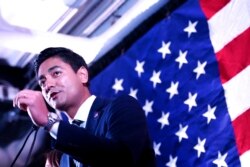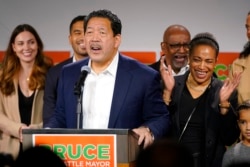As elections took place in states across America on Tuesday, Asian American candidates made history with solidified and projected victories in three major cities.
Mayoral races in Boston, Cincinnati and Seattle drew just as much national attention as the tight gubernatorial races in Virginia and New Jersey.
Michelle Wu, the daughter of Taiwanese immigrants, claimed victory in Boston's mayoral race, as unofficial returns signaled a strong defeat of opponent Annissa Essaibi George, prompting the city councilor to concede.
Wu, 36, will now become the first woman, first person of color and first Asian American to serve as Boston's mayor, breaking the city's long tradition of electing white men to the top office.
The former president of the Boston City Council ran on a progressive platform that emphasized racial, economic and climate justice. She gained voters' support with her commitments to create free public transportation and align city contracting to close the racial wealth gap.
The Boston Globe reported that Essaibi George ran a "more moderate and traditional campaign." In the end, Wu succeeded by securing the votes of progressives and Boston's communities of color.
Following her victory, Wu addressed supporters.
"We are ready for every Bostonian to know that we don't have to choose between generational change and keeping the streetlights on, between tackling big problems with bold solutions and filling our potholes," she said.
Wu reiterated her commitment to working on behalf of all citizens.
"I'll never stop fighting to make all our systems work for all of us," she said.
In Cincinnati
Aftab Pureval, a 39-year-old lawyer and son of Indian and Tibetan immigrants, will become Cincinnati's first Asian American mayor.
After unofficial returns projected Pureval's victory, his opponent, longtime Cincinnati City Council member David Mann, conceded.
Pureval, who is the current Hamilton County clerk of courts, ran on a commitment to bringing new ideas to the city, with goals of rebuilding Cincinnati's economy, reforming its police department and creating more affordable housing, as well as addressing public safety and transportation.
Mann, a former Cincinnati mayor and U.S. congressman, campaigned as an experienced candidate who would steadily guide the city out of the pandemic, according to The Cincinnati Enquirer.
In a statement from his campaign Wednesday, Pureval expressed gratitude for voters' support.
"We have the vision, and I can't wait to help drive growth and equity in Cincinnati. I'm humbled to be a part of the wave of newly elected Asian American mayors," he said. "Representation matters, and this is only the beginning."
In Seattle
In Seattle, early returns indicated that Bruce Harrell, 63, who is half Black and half Japanese, would likely become the city's first Asian American and second Black mayor.
According to The Seattle Times, Harrell, a former member of the Seattle City Council, had secured 65% of the votes counted thus far and maintained a nearly 30 percentage-point lead over opponent and City Council President M. Lorena González.
"You believed in what we're trying to do. We believe in this city. This city has awesome potential," Harrell said while addressing supporters Tuesday night.
His campaign placed a strong focus on addressing Seattle's homelessness problem and increasing the city's police force, while also tackling concerns about systemic racism and implicit bias among first responders. González's campaign previously expressed support for defunding the police department, according to The Seattle Times.
Despite Harrell's significant lead, González maintained that her campaign would wait for the election's final results.
"We respect every vote as equal, regardless as to when it was cast," she said in a statement to supporters Tuesday night.







